Overton Blog
COP26: Analysis of climate change policy documents
COP26 is on the horizon and the world will be watching Glasgow as discussions take place that could shape our collective future. Understanding the relationship between scientific research and real world policy could not be more crucial in this space – so we decided to see what Overton’s data could tell us about the dynamics of climate change policymaking.
We searched for all policy documents with the topic “climate change” (as classified by our AI) and built a Report within the Overton platform to understand the characteristics of these documents (see below for more methodological notes).
We found 51,789 policy documents, from 143 countries and 1014 policy sources – this is the cohort we looked at for this analysis.
Key findings:
- More than double the number of climate change policy documents published globally in 2021 compared with 3 years ago
- 4% of all policy documents published so far in 2021 relate to climate change, up from 1% in each of the previous 6 years
- Harvard tops the list of research institutions cited in climate change policy documents, followed by Stanford, Oxford, University of East Anglia and CSIRO
- The USA produces the most climate change policy documents of any country, followed by the UK, France, Canada and Germany; IGOs and the EU would also feature in the top 5 if we included non/inter-state blocs
- Pacific island states Palau, Kiribati and Micronesia produce the most climate change policy documents per capita; Maldives, New Zealand and Ireland are also in the top 10 per capita
Are more policy documents on climate change being published each year?
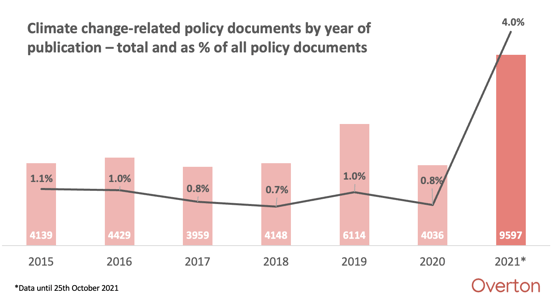
We looked at the number of climate change-related policy documents published each year since 2015. Between 2015 and 2018 the number of publications stayed around 4000 per year, then it jumped up by a third in 2019 to 6114. The Covid effect seems to have dampened publication activity during 2020 but 2021 has already seen a huge increase on previous years’ output.
With 9597 documents published to date, there have been more than double the number of climate change policy documents published globally in 2021 compared with three years ago in 2018.
2021's climate change policy documents have been published by a wide range of sources but some significant drivers are the EU, UN and Food & Agriculture Organization, the World Bank, the Irish, UK and Dutch governments, Congressional hearings in the US and Parliament select committees and research briefings in the UK, each of which published at least 100 more documents relating to climate change than they did in 2020.
We also looked at how climate change-related documents have changed as a proportion of all documents within the Overton database. We found that climate change policy documents rose to 4% of the total policy output in 2021 so far, up from 1% in each of the previous 6 years, suggesting that climate change is moving up the global policy agenda.
Which institutions are most cited in climate change policy documents?
We looked at the connections between the climate change policy documents and the scholarly research that it cites. Then we looked at which institutions produced this scholarly research.
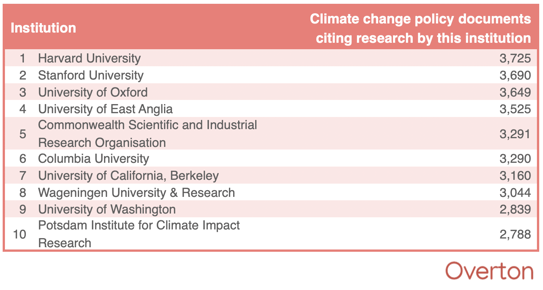 The top cited institution was Harvard (USA), followed by Stanford (USA), University of Oxford (UK), University of East Anglia (UK) and the Commonwealth Scientific and Industrial Research Organisation (AUS).
The top cited institution was Harvard (USA), followed by Stanford (USA), University of Oxford (UK), University of East Anglia (UK) and the Commonwealth Scientific and Industrial Research Organisation (AUS).Which countries produce the most climate change policy documents?
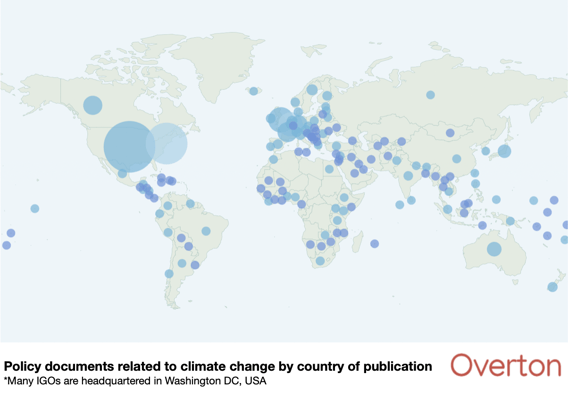
When looking at the policy documents by the policy source country, the USA topped the charts for the overall output of climate change policy documents. This was followed by the UK, France, Canada and Germany. A large proportion of the policy documents were also published by intergovernmental organisations (IGOs) and the EU.
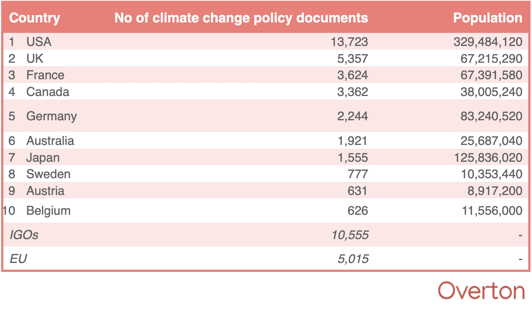 Of course, publishing policy documents does not equate to action on climate change – it’s entirely possible that some countries talk a lot about climate change but don’t actually follow through with actions. However, it is probably a relatively good indicator of the level of public and governmental awareness of the issues within a given country, which could be a precursor for public pressure and future action.
Of course, publishing policy documents does not equate to action on climate change – it’s entirely possible that some countries talk a lot about climate change but don’t actually follow through with actions. However, it is probably a relatively good indicator of the level of public and governmental awareness of the issues within a given country, which could be a precursor for public pressure and future action.
We also looked at population size alongside the number of policy documents, in order to calculate the policy output per 10,000 people*. When looking at the data in this way, we found that several countries with small populations punch above their weight in terms of the policy document output on climate change. Pacific and Indian Ocean island states Palau, Kiribati, Micronesia and the Maldives, as well as New Zealand and Ireland, appeared in the top 10 countries by output per capita. Canada, the UK, Australia and Sweden – which have larger populations – also appear in the top 10 in terms of output per capita.
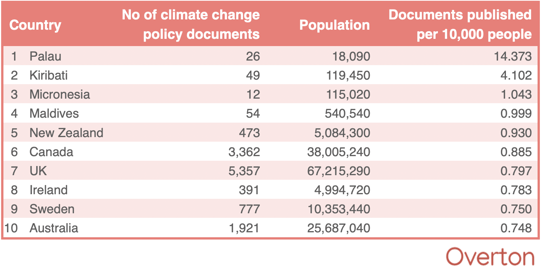
About this analysis
This top level analysis was conducted using the tools within Overton's platforms. However, some clients prefer to use our API or export functions to extract the raw data to run more complex analyses and link it with their own datasets.
If you have any ideas for future areas we could investigate in a data story, or if you'd like to have a look at the data yourself, get in touch!
Notes on methodology, data and potential biases
- We included all policy documents found within the Overton database matching the search term "topic:climate change" – this includes all types of documents, policy sources and countries.
- We included documents published from all time; however Overton's data is comprehensive from 2015 onwards and documents published since then account for 70% of this cohort.
- We define policy documents very broadly as documents written primarily for or by policymakers (see our explanation). This includes documents from governments, think tanks and IGOs among others, and all types of documents, such as working papers, think tank research and committee reports.
- Overton extracts topics automatically from all documents in our database. Topic classification works across languages so the dataset includes non-English policy documents (see our explanation).
- We make every effort to ensure global coverage of policy sources; however some countries are less well tracked because their documents aren’t routinely digitised, are behind login walls or there are technical barriers to tracking their sites (see our explanation)
- There are more search terms related to the topic of climate change, but we decided to just use "climate change" as it is the primary focus of COP and is used extensively in policymaking and research.
- The population data was taken from World Bank.
- We haven't finished collecting all documents from 2021 so it is possible that the documents we already have are biased towards climate change, though we see the same peaks in parts of the data where collection is complete.
- *We excluded countries with an output of fewer than 10 documents in order to avoid skewing the figures.
Join the newsletter
What is Overton
We help universities, think tanks and publishers understand the reach and influence of their research.
The Overton platform contains is the world’s largest searchable policy database, with almost 5 million documents from 29k organisations.
We track everything from white papers to think tank policy briefs to national clinical guidelines, and automatically find the references to scholarly research, academics and other outputs.
